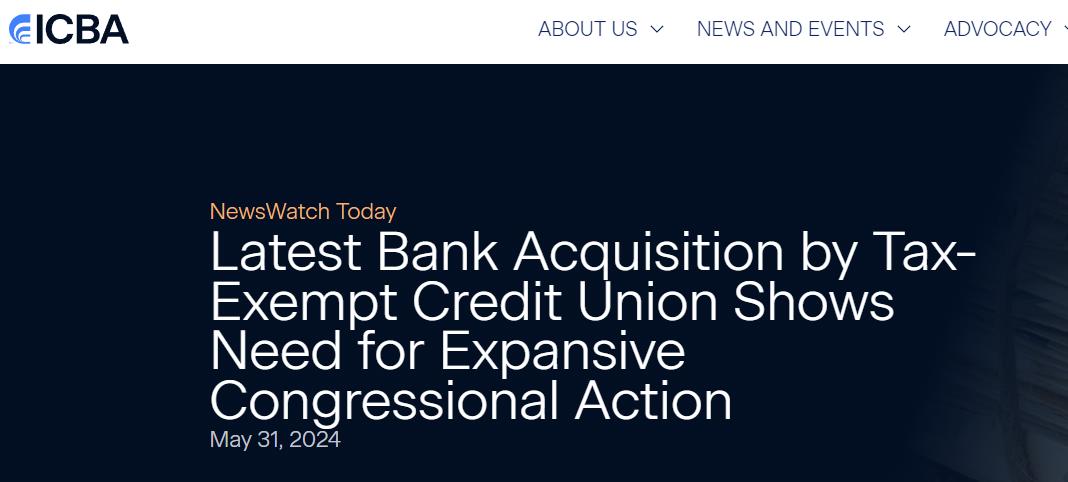Credit unions are run under NCUA guidelines while banks are FDIC. NCUA has stricter standards and are not for profit. Sounds like someone is upset they cant get their fingers in the money train.

“The Independent Community Bankers of America (ICBA), led by President and CEO Rebeca Romero Rainey, has expressed concerns about the recent purchase of a tax-paying bank by a tax-exempt credit union. This deal is the 11th such transaction in 2024, indicating a trend in the U.S. financial sector. Rainey notes that this trend expands the federal tax exemption to assets now totaling over $2 trillion and affects community banks, which are key local credit providers.
Rainey highlighted the negative impact of current regulations that she believes favor credit unions over community banks. She stated that recent changes in regulations have introduced numerous new rules, complicating the industry and encouraging consolidation. This situation has made it easier for credit unions to buy banks than for banks to acquire or merge with credit unions, due to fewer regulatory barriers from the National Credit Union Administration compared to federal banking regulators.
The ICBA is calling on Congress to address this issue, which now accounts for about a quarter of all banking sector acquisitions in 2024. Some states, including Tennessee and Nebraska, have started to pass laws against these acquisitions. However, ICBA thinks a national effort is needed. They suggest holding congressional hearings, conducting a Government Accountability Office study of the credit union sector, and possibly implementing an ‘exit fee’ on acquisitions to compensate for the tax revenue lost when a bank becomes tax-exempt.
According to a poll by Morning Consult for ICBA, there is widespread public support for Congress to review credit union policies, especially regarding their tax and Community Reinvestment Act exemptions. ICBA references the 1951 congressional action that ended tax exemptions for similar institutions to support their position that current policies need reevaluation.”
Visit here for more details
If the trend of tax-exempt credit unions buying out tax-paying community banks continues, several negative outcomes could arise. First, local community banks, which are crucial for providing credit to small businesses and individuals, may diminish, leading to reduced access to localized banking services. This could disproportionately affect rural and underserved communities that rely heavily on community banks.
Second, the expansion of tax exemptions to a larger portion of the financial sector could lead to significant tax revenue losses for federal and state governments. This reduction in tax income could impact public services and infrastructure funding.
Third, the consolidation of banks into credit unions might reduce competition within the financial sector, potentially leading to higher fees and less favorable loan terms for consumers. With fewer community banks, the diversity of financial products and services available to customers might decrease.
Additionally, if regulatory barriers continue to favor credit unions over community banks, it could create an uneven playing field, further disadvantaging smaller banks and potentially leading to an increased rate of bank failures or forced mergers.
Finally, the stability of the financial sector could be threatened if credit unions, traditionally not equipped to handle the complexities of large-scale commercial banking, struggle with the management of their rapidly expanding asset base. This mismanagement could lead to financial instability or even crises within the credit union sector, potentially necessitating government intervention or bailouts.
h/t Phennommennonn